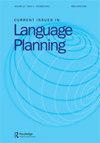English only or more?: Language ideologies of international students in an EMI university in multilingual Hong Kong
IF 1.8
1区 文学
Q2 EDUCATION & EDUCATIONAL RESEARCH
引用次数: 8
Abstract
ABSTRACT This paper investigates the language ideologies held by a group of international students in an English medium instruction (EMI) university in multilingual Hong Kong. The findings indicate that the participants’ beliefs about English extend beyond its role as an instructional medium and encompass its use as a lingua franca and as a means of social inclusion. It is also found that the participants hold complex yet sometimes contradictory ideologies about the kinds of English to be used and/or accepted and about the monolingual and multilingual uses of English in the EMI university context. Taken together, the study suggests that the participants’ ideologies with respect to the roles of English and the norms of English use in the EMI university context are much more complex than what language policy from above suggests. The findings also reveal the ideological tensions over the norms of English use in the EMI university context and the closely intertwined relationship between the participants’ language ideologies and the maintenance of their interests, especially in relation to access to learning opportunities in the classroom. The study calls for attention to broader issues pertaining to social inclusion/exclusion, linguistic advantage/disadvantage and educational equality/inequality in the multilingual EMI university context.只会说英语还是更多?:多语言香港一所EMI大学国际学生的语言意识形态
摘要本文调查了香港多语种地区一所英语教学大学的一群国际学生的语言意识形态。研究结果表明,参与者对英语的看法超出了它作为教学媒介的作用,还包括它作为通用语言和社会包容手段的用途。研究还发现,参与者对英语的使用和/或接受类型以及英语在EMI大学环境中的单语和多语使用持有复杂但有时相互矛盾的意识形态。综上所述,该研究表明,在EMI大学背景下,参与者关于英语角色和英语使用规范的意识形态比上面的语言政策所暗示的要复杂得多。研究结果还揭示了EMI大学背景下英语使用规范的意识形态紧张,以及参与者的语言意识形态与维护他们的兴趣之间密切交织的关系,特别是在课堂上获得学习机会方面。该研究呼吁注意与多语言EMI大学背景下的社会包容/排斥、语言优势/劣势和教育平等/不平等有关的更广泛问题。
本文章由计算机程序翻译,如有差异,请以英文原文为准。
求助全文
约1分钟内获得全文
求助全文
来源期刊

Current Issues in Language Planning
Multiple-
CiteScore
4.80
自引率
16.70%
发文量
26
期刊介绍:
The journal Current Issues in Language Planning provides major summative and thematic review studies spanning and focusing the disparate language policy and language planning literature related to: 1) polities and language planning and 2) issues in language planning. The journal publishes four issues per year, two on each subject area. The polity issues describe language policy and planning in various countries/regions/areas around the world, while the issues numbers are thematically based. The Current Issues in Language Planning does not normally accept individual studies falling outside this polity and thematic approach. Polity studies and thematic issues" papers in this journal may be self-nominated or invited contributions from acknowledged experts in the field.
 求助内容:
求助内容: 应助结果提醒方式:
应助结果提醒方式:


